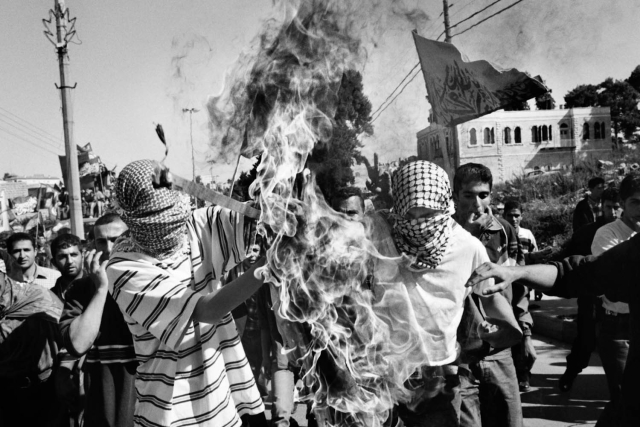The Intifada was not initiated by any one single event but as a result of rising tensions between the Israel Defense Forces, who were heavy-handed at times, and Palestinians. Local territories would often be led by PLO affiliates or followers. The organization itself and most of their leadership were located outside of Israel, in Tunisia, Beirut, and Cairo. They were barred from entering Israel and so it was imperative that they developed local leadership.
In response to several incidents in which localized Arab riots were met with fierce defense by the IDF, the local PLO leaders made a collective agreement to abstain from any violence to minimize the tension and the violence, however, this agreement was violated by those taking orders from the PLO leadership outside Israel who organized a deadly wave of terror that included bombs on busses, restaurants, schools and other civilian targets. In real terms, it was an Israeli bloodbath that was the most deadly time for Jews in Israel since the creation of the State, and that included the numerous wars. IN response to this wave of terror, Israel created a new organization called the “Iron Fist” which attempted to subdue the Palestinian attacks and was confident that the Palestinian resistance would soon come to end. This idea, however, would later prove to be wrong.
In 1987, an Israeli businessman was stabbed and killed in Gaza. The Palestinians protested in the streets, in response to an increased IDF presence. The IDF responded to the protests with tear gas. Palestinian laborers went on strike, refusing to show up to work. The situation escalated when the Palestinians started throwing rocks, Molotov cocktails, and burning property, much of it Arab-owned, throughout the Gaza Strip and West Bank. Israel started a campaign of mass arrests and closed many Universities in the West Bank that were believed to be the staging areas for the PLO-led uprising. It was at this time that an organized resistance began, where Palestinians refused to pay taxes. Prior to the PLO campaign and infiltration of Palestinian campuses, Palestinians paid taxes, gas, water, and electricity bills just as Israeli citizens had. The rates were even less for Palestinians than they were for Israelis. Soon, Israel began to impose fines on the families of the students involved in organizing and orchestrating violent protests.
During the six-year Intifada, Palestinians did not just target Israelis, they also killed Arabs in their own communities who were seen as betraying their people by siding with Israel. Many Arabs simply wanted to live in peace and understood that Israel had been good to them, and aside from voting did not treat them as second class. Many Arabs wanted to work, they wanted the freedom of mobility they enjoyed before the PLO began a campaign of terror that led Israel to take measures that would affect all Arabs in the territories. For those Arabs who were found to have released information to the Israelis, the PLO made examples of by hanging them in village centers, often disemboweling them in hopes of frightening anyone who might have thought of helping Israel quell the unrest. As a result of this horrific policy, thousands of Palestinians were killed by their own members.
The fortunes of the terror leaders changed in 1988 when Israel sent a commando unit to assassinate the senior leader of the PLO. The Arab League, in response, began to support the Intifada financially, giving the PLO the resources needed to continue and escalate the violence. The Israelis wanted to prove that refusing to obey the law results in consequences and the PLO wanted to prove that no Israeli civilian would be safe no matter where they were in the country. It was around this time that the idea of Palestine as a country, in the West Bank and Gaza became mainstream, and movements all over the world, funded primarily by the Arab League to mimic the same strategy used in the Judea and Samaria, that is using Universities across America and Europe to create a movement that would advocate for a 'Free Palestine'.
Despite the civilian deaths at the hands of Arab bombers, the United Nations condemned Israel for its actions during the Intifada. Israel refused to comply with the demands of the UN because the organization did not acknowledge the terror attacks on Jewish worshippers at the Western Wall or the victims of numerous bus bombs. Furthermore, Israel kept on denying UN access to the area for their own independent investigations. In the end, it was moderate Arab countries that helped stop the Intifada, confirming the extreme violence was initiated and carried out by 'Palestinian Arabs'. Jordan was first, severing financial ties with the West Bank; Saudi Arabia was next, cutting off PLO from the vast financial support it had received until then. All told, the Intifada claimed the lives of over 3000 Palestinian Arabs, mostly at the hands of PLO supporters, and over 1000 Israelis were killed.


